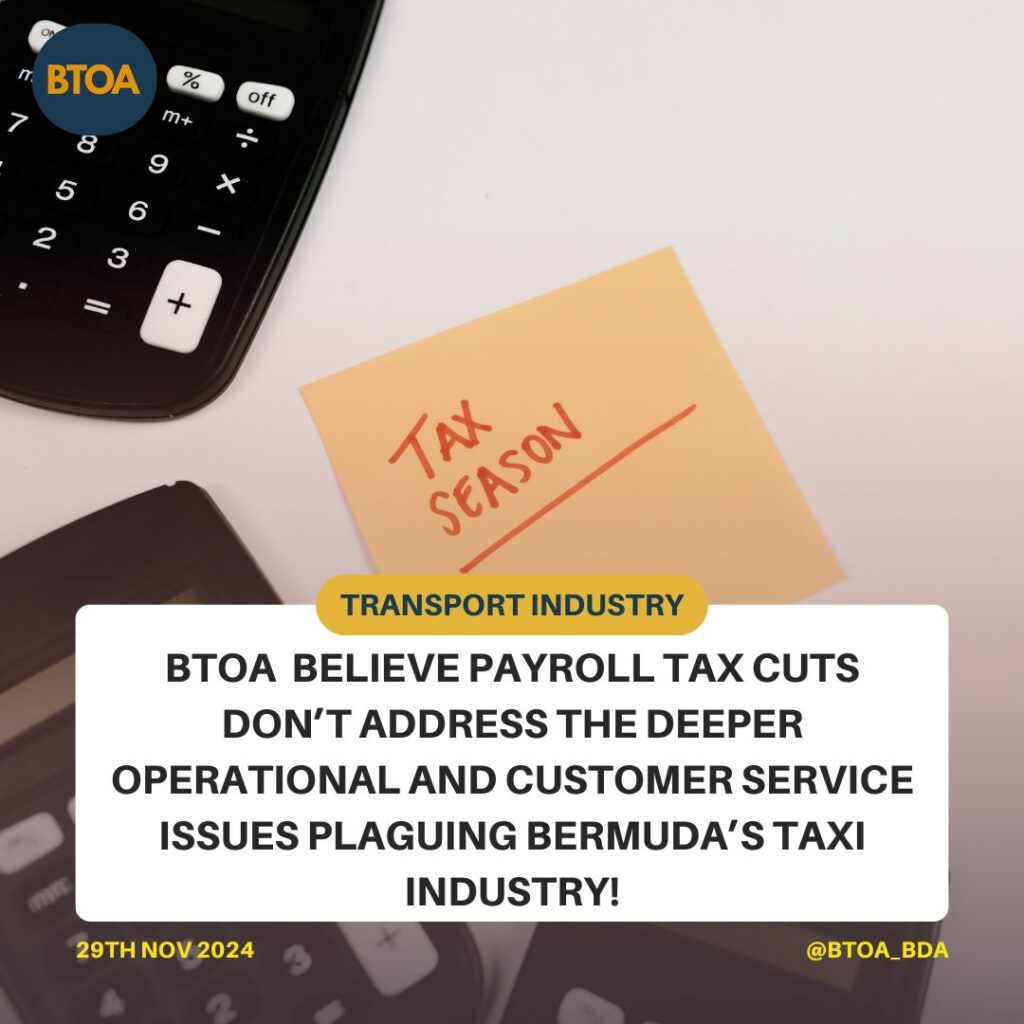Exploring the Impact of Payroll Tax Changes on Bermuda’s Taxi Industry

On Friday, 29th November 2024, the Minister of Transport introduced the Payroll Tax Amendment (Bill #2), a proposal aimed at simplifying the payroll tax system for the Public Service Vehicle (PSV) industry. While the Bermuda Taxi Owners & operators Association (BTOA) appreciates the intention behind this measure, we believe it misses the mark in addressing the deeper operational and customer service issues plaguing Bermuda’s taxi industry.
What is the Taxi Payroll Tax Amendment About?
The proposed changes to the payroll tax system include a new tiered structure for minibusses and a reduction in payroll tax for taxis: (GOV Outline of Payroll Tax)
- Minibuses:
- 15 seats: $750 annually
- 16–24 seats: $1,000 annually
- Over 24 seats: $1,500 annually
- Taxis:
- Annual payroll tax reduced from $1,000 to $600.
According to the Minister, these changes aim to enhance compliance, reduce complexity, and ease financial burdens on PSV operators. (Video of Transport Minister Below)
Our Position on the Taxi Payroll Tax Changes
The BTOA acknowledges the financial relief this tax reduction offers, but we firmly believe that the changes fail to tackle the root issues affecting the industry.
- Operational Challenges Remain Unaddressed
While reducing the taxi payroll tax alleviates some financial pressure, it does not address ongoing operational inefficiencies or customer service concerns. Customers frequently cite problems like inconsistent availability, lengthy wait times, and limited service options. Without solutions to these issues, the industry’s reputation and functionality remain at risk. - Non-Compliance and Fairness
The government noted that many taxi owners do not currently pay payroll tax. While the simplified structure may encourage compliance, the absence of a detailed plan to enforce payment raises concerns. What mechanisms will ensure every operator contributes fairly? - Unclear Data Supporting the Tax Structure
The BTOA questions the rationale behind the fixed tax rates. What data or methodology was used to determine the amounts for minibusses and taxis? Transparency is key to building trust and ensuring these reforms are equitable.
The Positive Impacts of the New Taxi Payroll Tax
We recognize several potential benefits:
- Cost Savings: A 40% reduction in payroll tax frees up $400 annually for taxi owners. This could help cover essential expenses like vehicle maintenance, insurance, and licensing fees.
- Simplified Tax Process: The fixed rate removes the need for complicated calculations, making it easier for operators to comply with tax obligations.
These improvements are welcome, but they do not address the broader challenges within Bermuda’s taxi sector.
A Call for Comprehensive Reform
The BTOA urges government officials to take a broader approach to revitalizing the taxi industry. We propose the following actions:
- Modernize Taxi Operations: Introduce systems like centralized dispatching to improve service efficiency and customer satisfaction. A modern, tech-driven approach would position Bermuda’s taxis as a reliable transportation option for both locals and tourists.
- Enforce Existing Laws: Utilize provisions within the Bermuda Motor Taxi Act to ensure compliance with operational requirements. For example, the law mandates that taxis operate for 16 hours daily. Enforcing this rule would increase availability and ensure vehicles serve the public effectively.
- Enhance Customer Service: Develop policies that directly address customer concerns, such as reliability, professionalism, and service quality. Improving these areas will benefit both customers and operators.
- Ensure Accountability: Establish robust systems to monitor compliance with tax and operational standards. Taxi owners must take responsibility for ensuring their vehicles are on the road and adhering to regulations.
Why "Band-Aid" Solutions Aren’t Enough
While we appreciate the government’s effort to reduce costs for operators, these changes feel more like a temporary fix than a meaningful solution. The focus on minor adjustments, like reducing the taxi payroll tax, overlooks the deeper issues undermining the industry’s efficiency and customer satisfaction.
The BTOA calls on the government to collaborate with stakeholders and develop a comprehensive strategy that delivers lasting improvements. Symbolic gestures and political “quick wins“ will not suffice—we need tangible action that benefits operators, customers, and the industry as a whole.
Final Thoughts
The BTOA remains committed to advocating for the interests of taxi operators and pushing for meaningful reforms. We encourage our members to stay informed and engaged in these discussions. Together, we can work toward a more modern, efficient, and customer-focused taxi industry that benefits all Bermudians.
For more information and updates, follow us on social media or visit our YouTube channel.
Share Your Thoughts!
What do you think about the new taxi payroll tax changes? Are they enough to transform Bermuda’s taxi industry, or do we need deeper reforms? Share your views on YouTube comments or the Facebook, Instagram, Or LinkedIn comments of this article, or contact the BTOA directly at info@btoa.bm.
